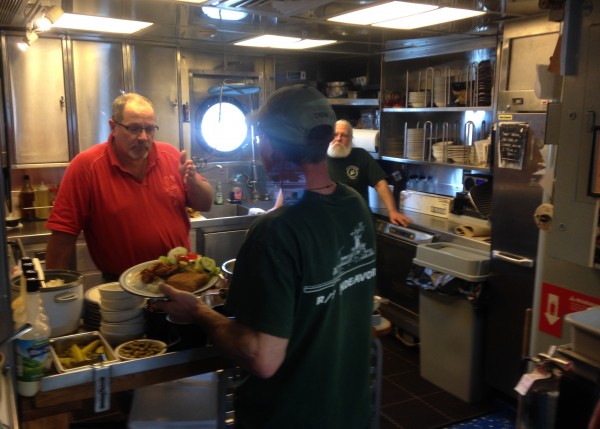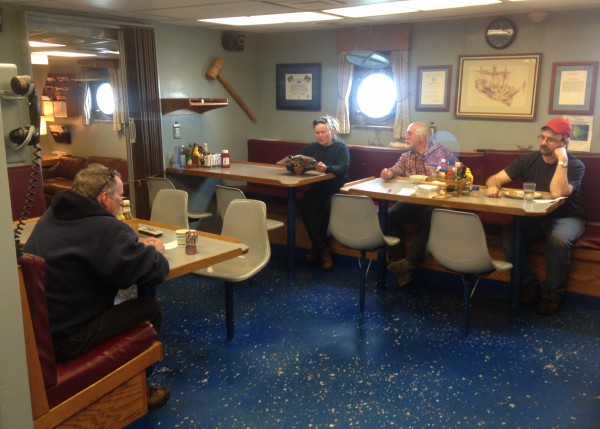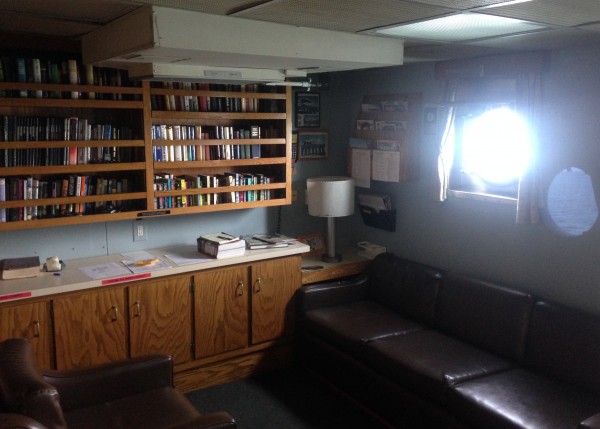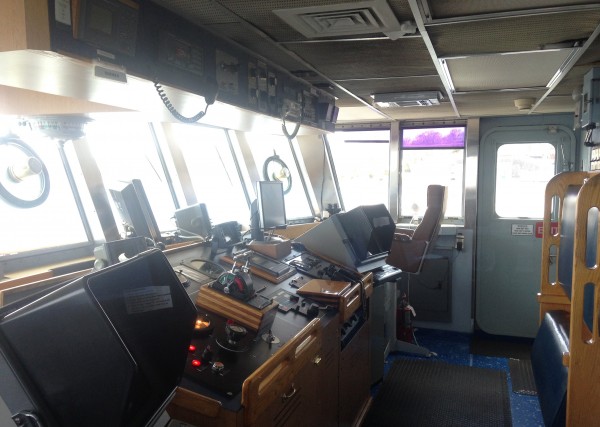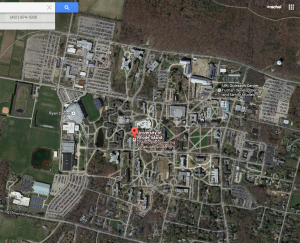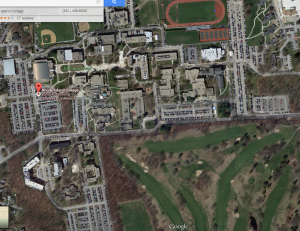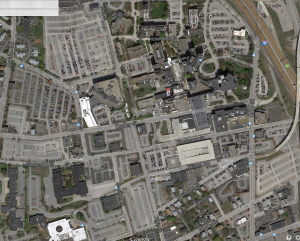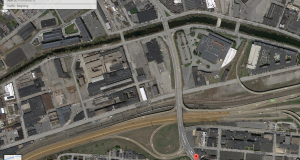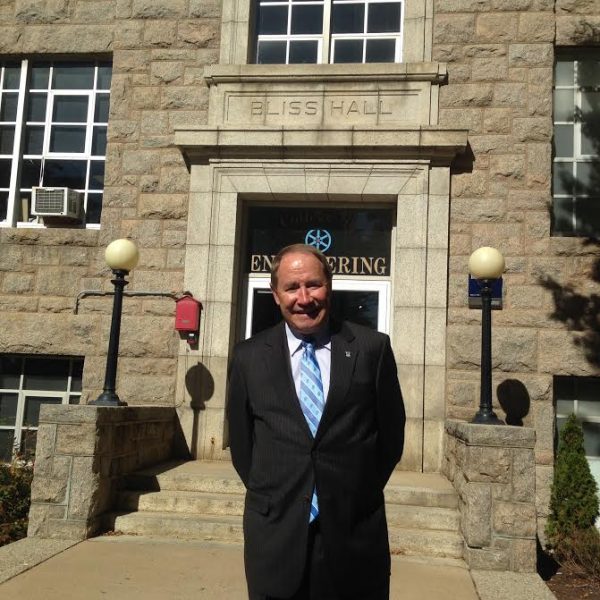 There are two University of Rhode Island projects that would benefit if voters pass Question 4 on the statewide ballot this November.
There are two University of Rhode Island projects that would benefit if voters pass Question 4 on the statewide ballot this November.
One is a $25.5 million upgrade to Bliss Hall, a prominent classroom building on the Quadrangle at the center of campus that was built in 1929, and “hasn’t really been renovated since then,” said URI President David Dooley in a recent interview with RI Future.
“The exterior will look exactly the same except the air conditioners won’t be sticking out the window any more because we will have state-of-the-art HVAC,” Dooley explained, “and there will be an addition on the back facing all the new engineering construction that will be going on behind Bliss Hall starting next year.”
The Bliss Hall renovation is part of an overall $150 million project, started under Governor Chafee, to upgrade the engineering program and its facilities, which Dooley described as a major area of growth at URI.
“We know it is one of our fastest growing colleges,” he said, noting there are more than 30 local businesses started by graduates of URI’s engineering school. “We know that every year we have more applications to the College of Engineering than we did the year before. We know we can’t accommodate all the qualified applicants that want to come here to become engineers.”
The second part of Question 4 would direct $20 million to fund “innovation campuses” – or partnerships with the private sector.
“We want to do things that broadly build a robust and successful economy in this state and in the nation,” Dooley told me. “I do think we know enough about the importance of innovation and growing the American economy and keeping America competitive in an increasingly competitive global economy and we know enough about how innovation can fuel not just economic prosperity but also enhance the social fabric of the state and the nation to know that these kind of centers – which are well-precedented, and there are a wealth of success stories out there – can work, can be a magnate for investment in Rhode Island and can attract new talent into Rhode Island as well as create a wealth of new opportunities for the Rhode Islanders that are already here.”
Companies would apply in a public process, that has yet to be defined, and provide matching funds. The $20 million could go to several companies, or just one. “We know that they are going be selected on the basis of what looks like a good return on Rhode Island’s investment in terms of new jobs, new businesses and economic growth,” Dooley said. “How those get translated into very specific points is yet yet to be determined. We certainly expect to play a role in that because we think we have a lot of expertise to share in those areas.”
URI already has such partnerships with companies such as Amgen, Hasbro, Ratheon and Schneider Electric.
“We’ve already got some examples of companies that have come to Rhode Island specifically because they wanted to work closely with URI,” Dooley said, mentioning Navatek in Wakefield. “They are a Hawaii-based company. They opened up their second office right here in proximity to URI just so they could work with URI faculty and students on ocean engineering.”
Dooley said he was comfortable, both professionally and personally, if a defense contractor started an innovation campus with URI.
“To a degree, I can be comfortable with that because I do think we have a responsibility as the world’s leading democracy to provide leadership and in our 21st Century world that continues to mean that in addition to all the robust diplomatic efforts you can mount, you have to have the military capability to say this is what needs to happen or to intervene, if necessary,” he said. “That’s how I think about it individually, as the president I think about it as our responsibility is really to serve all the people of Rhode Island and therefore that includes individuals who are working in the defense industry here in Rhode Island.”
Dooley said he doesn’t worry that the matching funds will incentivize the university to educate for the market, rather than for enlightenment. He said URI’s general education requirements guarantee that can’t happen.
“It is the kind of investment that I think Rhode Island needs to continue to make in order to build not just an economy but a society that is robust and vibrant,” he said. “It’s about driving education, driving research forward and driving innovation. Because that nexus of innovation, the research, development transfer component of innovation been such a source of growth for the American economy ever since World War II, frankly.”
]]>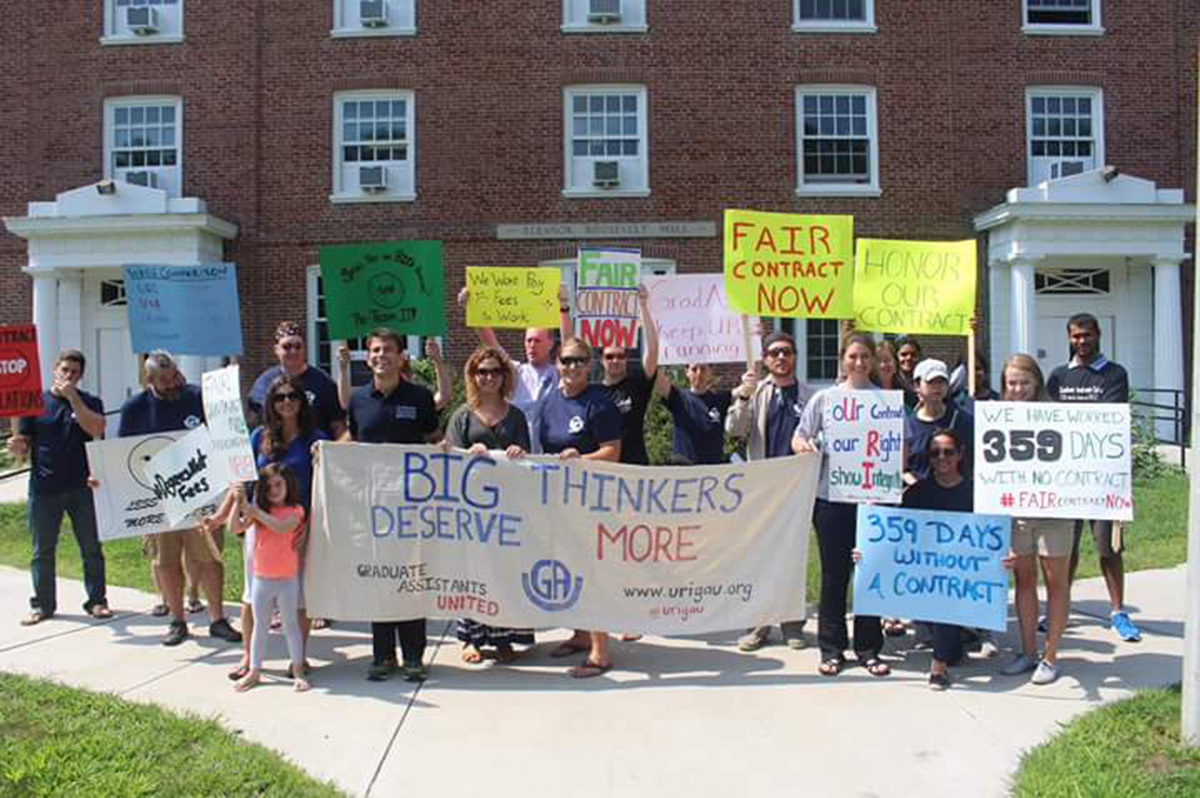
What do we want? Free parking!
What?
Greater City Providence deserves journalistic credit for picking up on a story about graduate student organizing at URI and connecting the dots about how those demands impact environmental planning goals. I wanted to make a specific repost here, as well as add a few thoughts of my own, because I don’t find that the labor world and the environmental world always talk to each other very effectively in Rhode Island (or anywhere, maybe). People who read RI Future, like myself, care about labor organizing and what it portends for a more equal future for all of us at the workplace, but may also be concerned about exactly the points that GCPVD brought to light.
The story: The URI grad students reportedly have asked for a continuation of free parking at URI’s downtown Kingston campus. In an earlier version of this article, I had given information about downtown and Kingston, but in this sentence I accidentally glossed over and left only the word “downtown” during last minute corrections. The union has been clear that its demands relate only to the Kingston campus. I am keeping downtown information here as well for context because I think it’s relevant to URI’s overall parking policy discussion. Apologies for the error! The free parking is of course not really free at all, but costs taxpayers money to subsidize the garages where people park, and policies that subsidize parking warp commute choices towards driving. In addition, URI stands out for having very incomplete and inconvenient transit pass policies. The result is a very easy and cheap drive commute competing with a more cumbersome and expensive transit one, right across the street from Kennedy Plaza. Students at URI Main Campus in Kingston have access to the 66 and 64 buses and an excellent bike path through South County, and could in short order have MBTA service as well. Grad students naturally see the attempts from university officials to charge them for parking as an attack on their already meagre livelihoods, but it’s an ominous sign for the future of Rhode Island if free parking policies continue in such obvious transit-oriented locales.
Where I would add to what Jef Nickerson of GCPVD has said is that I actually think this is a relatively easy issue to resolve, and doesn’t at all have to pit us either against the environment or against unions. The solution here is to charge full price for parking just as the university has proposed, but also credit grad students with that cost as pay which can be used for whatever they like. That would mean that workers who bike or ride the bus effectively get a raise, while everyone else breaks even. Graduate students are right, in my view, to be pointing out the absurdity of their pay hovering around $15,000 a year. It’s just that the solution to that is better pay, not subsidized driving.
Many states, like California, require a parking cash out for workers in certain types of jobs. In California, it’s structured so that only employers who rent parking are required to give the cash out, because it’s assumed that rented parking spots are a liquid asset that can be dropped or maintained by the employer based on parking demand, and that the savings should be passed as part of people’s wages. In URI’s case, the parking that is rented is paid for by the state to the Dunk Center, and so is definitely that kind of liquid asset. In Kingston, as in downtown Providence, the parking situation is absurd. URI has been gradually tearing up more and more of the agricultural land around it to satisfy the needs of its students and faculty to drive instead of finding ways to resolve that through on-campus housing expansion, transit, or biking. Parking cash outs have a positive effect on commute modeshares–increasing carpooling, biking, walking, and transit-use.
It’s not probably well known, but there was a window of my life when I did a lot of labor organizing, and was even a card-carrying union member. The work that the grad students are doing to improve their working conditions is something I support. But an injury to one is an injury to all not just in labor situations, but also for our world as a whole, and it’s the duty of union members to imagine a new world in the shell of the old, not just to make shallow demands about their own needs. This is a time when the grad student union could show real leadership and modify its demands in order to get what it needs for its workers while also respecting the future of our planet.
I dreamt I saw Joe Hill last night,
Driving an S-U-V.
I said to Joe, “our planet’s dying”,
He said, “it’s up to me.”
He said, “it’s up to me.”
~~~~
]]>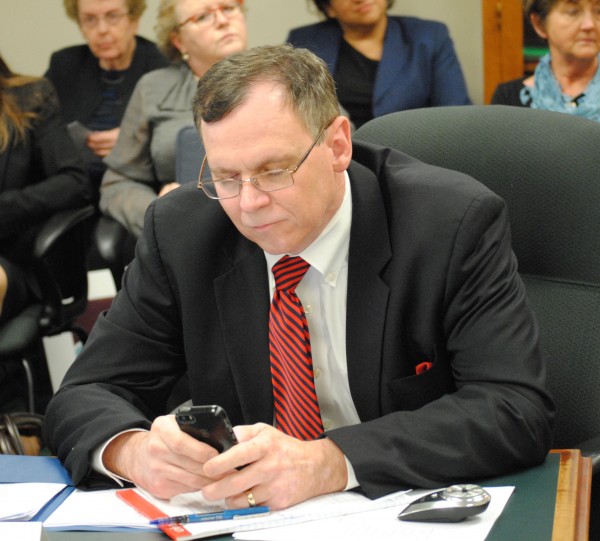
URI President Dr. David Dooley sat quietly as URI Part-Time Faculty United (URI PTFU) partnered with Rhode Island Jobs With Justice to carry signs and speak out at RI’s higher education board meeting Wednesday night against low wages, a lack of job security and a hostile work environment.
PTFU Executive Director Patricia Maguire said negotiations between URI and the part-time faculty have been dragging on for over 2 1/2 years. Rather than bargain in a fair and open way, URI negotiators simply say “we have nothing to offer you.”
Maguire said that her group has been reduced to “begging” for better wages and working conditions. “Any [school] president or the administration, that has received a substantial pay increase, did not have to walk around the university holding signs, asking for it. I’m not even sure they asked for it.”
Kenneth Jolicouer, with 35 years teaching experience in higher education and a host of honors to his credit, said that working conditions at URI have deteriorated markedly over the last few years.
“I had my part-time position taken away in September 2013, because according to administration, I worked too many hours,” said Jolicouer, “15 hours in a staff position plus teaching two classes. This is a position I have held since 1992. As a result my URI pay has been cut by close to 50 percent.”
During Jolicouer’s entire 4 1/2 minutes of speaking, he was ignored by board member Dr. Jim Purcell, commissioner of postsecondary education, who simply messaged with his cellphone the entire time. It was only when Dorothy Donnelly, another educator with years of experience, demanded his attention that Purcell began to feign interest. At the 2m 15s point in the video below, Donnelly asks Purcell for his seat, which he graciously gave up.
“We have about 25 people here supporting us. About half of those are part-time faculty,” said Donnelly, “That’s no surprise. I’m even amazed that they’re here. I thank them for their commitment and their courage, because they are all at will employees.”
“We have been in contract negations for almost three years now,” said Donnelly, “and we have not had contact negotiations since last December.” Donnelly need that these meetings are known for their repeated delays and stalling tactics on the part of URI negotiators.
“Part-time faculty continue to be ignored, exploited and disrespected,” said Patricia Maquire. URI doesn’t believe in the value of the education they are selling, says Maguire. Devaluing the educators devalues the education.
Also speaking was Peter Nightingale, a member of the physics department at URI and Fossil Free RI, there to express solidarity with the PTFU. Nightingale took some time to speak about URI’s lack of interest in divesting from fossil fuels.
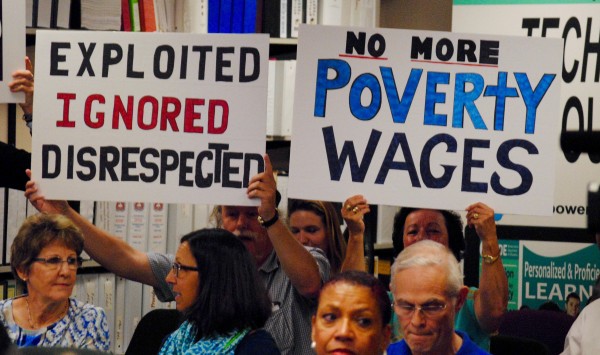
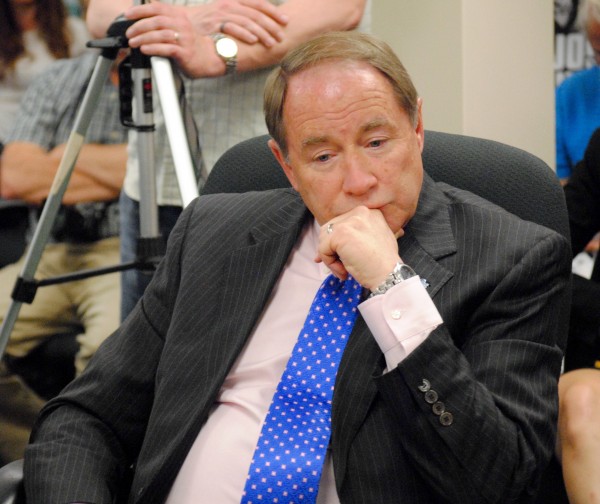
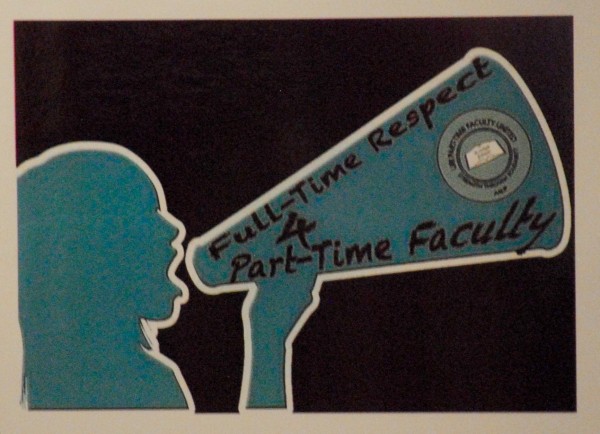
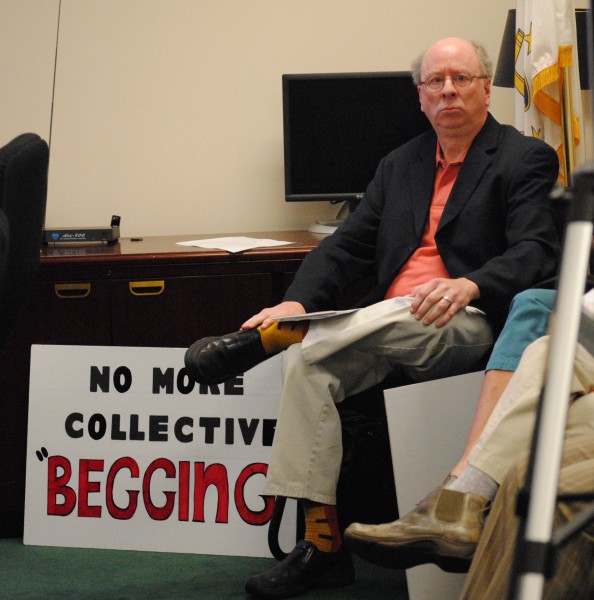
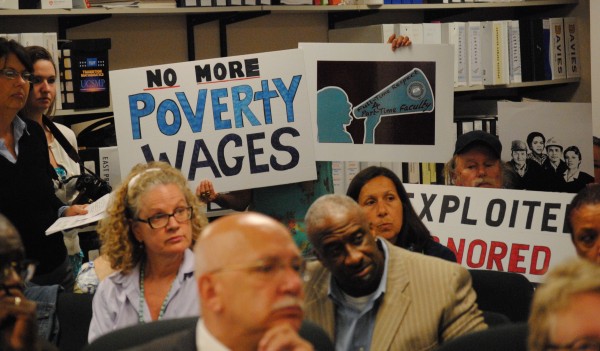
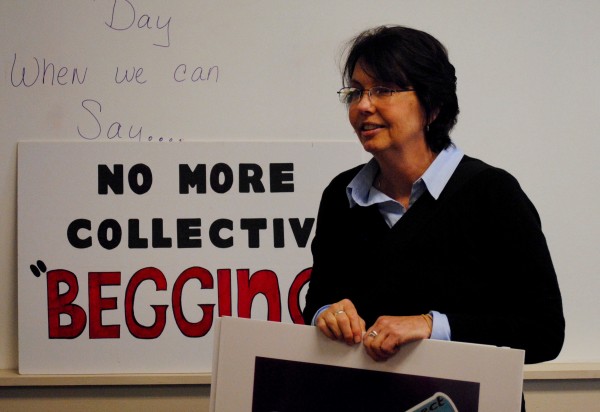
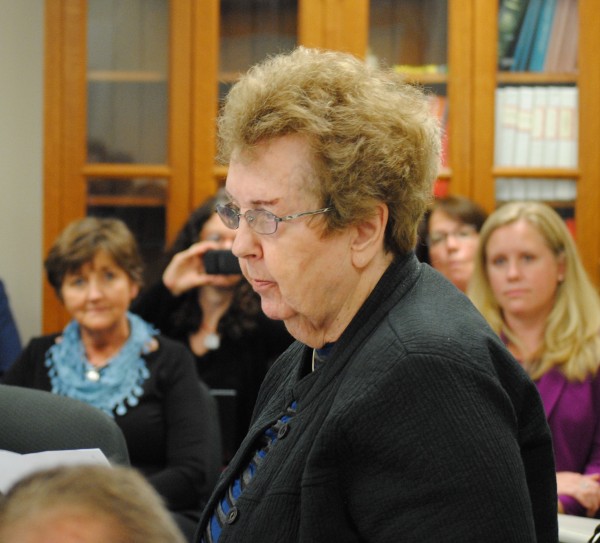
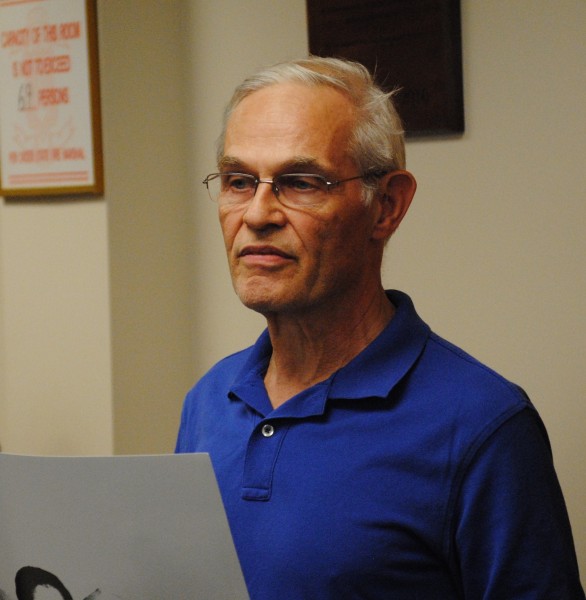
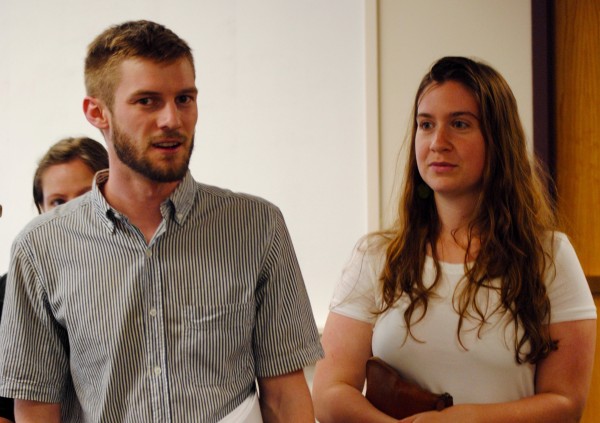
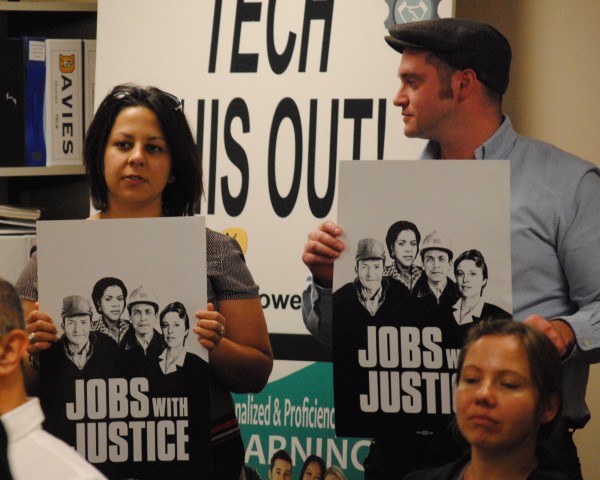
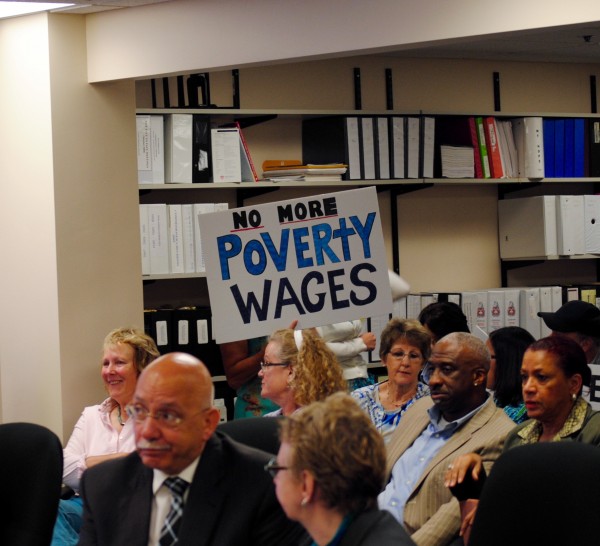

I’ve seen a lot of basketball games in Kingston and I’ve never seen a more packed house, a more enthused student section or a bigger upset than URI’s 66-62 overtime win against #21 Nebraska Saturday night. You can relive the biggest Ram victory since 1998 via my tweets from the game.
]]>
As the nearly half a million people participating in the People Climate March in New York City on September 21 demonstrated, we now depend on our leaders who are in the streets. They will secure our daily bread, and they will forgive our debts, as they organize everywhere.
The message echoing in the streets of New York and across the globe may come as a surprise to some. The following is from a report that Jared Paul posted after his arrest at #FloodWallSt in New York. In Jared’s My report back from #FloodWallSt / #PeoplesClimateMarch he makes the key point loud and clear:
Looking around it became clear that the majority of the messaging was blatantly anti-capitalist. Signs read: “Capitalism Is Destroying Our Planet,” “Corporate Globalism doesn’t work: System change now!” “Climate Change is Class War.” I thought it was just our area but as thousands of people streamed by on either side heading for different parts of the march, I saw that the signs were almost all of similar messaging. From watching #DemocracyNow I knew that there was a large contingent of First Nation activists leading the march with a clearly anti-capitalist message as well.
Not all of URI might be quite ready for this radical position, but some of us certainly are. However that may be and wherever you may find yourself on this political spectrum, please join us for the:
Global Frackdown at URI: October 10, noon-2pm in front of URI Foundation on Upper College Road, Kingston.
Green Power to the People!
 “Midnight Tonight: Students Protest LGBT Campus Safety at University of Rhode Island.” This was the headline on a Campus Pride blog of September 22, 2010, announcing a round-the-clock occupation of the URI library “to ensure the safety and inclusion of lesbian, gay, bisexual, and transgender (LGBT) students, faculty and staff.”
“Midnight Tonight: Students Protest LGBT Campus Safety at University of Rhode Island.” This was the headline on a Campus Pride blog of September 22, 2010, announcing a round-the-clock occupation of the URI library “to ensure the safety and inclusion of lesbian, gay, bisexual, and transgender (LGBT) students, faculty and staff.”
When the dust had settled in early 2011, students awarded their adviser, Andrew Winters, a “Certificate of Service and Admirable Citizenship,” honoring him as their advocate.
Within weeks, Andrew, at the time assistant to the VP for student affairs, received a blistering letter of reprimand. It consisted of unsubstantiated accusations and personal insults, and ended with a demand for his silence and the following threat: “If you do not comply with the above expectations […] you will face disciplinary procedure up to and including termination.”
Several weeks later, Andrew went on administrative leave; in June he succumbed to the pressure and left. Ever since, university officials have refused to comment other than stating to the press that he “retired,” and that: “Everyone was in agreement around the terms. He was not forced to retire.”
In fact, Andrew was bullied and coerced into a separation agreement that he signed under duress. Since then, also Joe Santiago, his former assistant, was “let go” from his position at the University without written notice or explanation.
Much of this, and another University of Rhode Island case of bullying has been on the news lately. See the Hummel Reports:
Also see this report in Unfiltered Lens, a student newspaper.
After what university administrators spun as retirement, Andrew has spent most of his time trying to correct these systemic problems with their countless victims of which he is one.
In spite of increasing awareness of the need for corrective action, elected officials and the Board of Education have, as is their pattern, neglected their responsibility. In Andrew’s case, inaction has been justified by: “He should take his case to court and have the separation agreement reversed.” But “liberty and justice for all” too often is an illusion for those who cannot act without the terror of losing their physical, emotional and economic health.
The root cause of the systemic failure at the University is that over the last 50 years state funding has dropped from 60% in the 1960s to a current low of less than 10%. As a consequence, university administrators have become public relations representatives whose main concern is financial rather than academic strength.
In the resulting environment of a privatized, bottom-line driven institution advocates for victims of bigotry, discrimination or sexual assault will be shot as messengers who threaten the “product brand.”
Silence and coverup also affect the public as this corporatized environment allows officials to enter into separation agreements with clauses such as this:
The University will not contest or object to Mr. Winters’ eligibility to collect and receive unemployment benefits or compensation.
As mentioned, Andrew Winters was coerced into this agreement. He would not have been entitled to unemployment compensation, had he retired voluntarily, as the University claims. He lost his job, and was qualified to collect, after he informed Department of Labor officials of the circumstances of his departure.
What excuse does the University have for doling out unemployment benefits and compensation via a ploy that cannot see light of day”
The regular citizen recognizes this for what it is: a conspiracy to defraud the People of Rhode Island. As in the case of 38 Studios, complicit officials leave it to the public to foot the bill for their shady deals.
The Rhode Island Legislature may have begun to address this misappropriation in the submission of House Resolution 2014 H 7669 “Creating a special legislative commission to investigate issues of fairness in the hiring and retention of certain faculty members and employees of the University of Rhode Island.”
Surely it is long past time to restore ethics and transparency to higher education and to public institutions in Rhode Island, and long past time to correct the injustice done to Andrew Winters, Joe Santiago and the People of Rhode Island.
We, the People, shall not rest until we have eradicated misappropriation, bullying, and suppression. We shall not rest until we have established a system of collaboration, transparency and justice for all.
]]>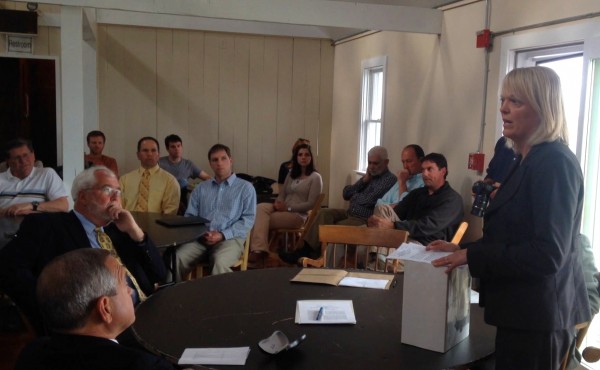
The state Department of Environmental Management and the URI Graduate School of Oceanography are partnering to produce more – and more efficient – data and analysis about the fishing industry here in the Ocean State.
The Rhode Island Marine Fisheries Institute “will enhance the state’s ability to positively affect marine fisheries research and management,” said Jason McNamee, a DEM biologist. He was speaking to a crowd of scientists, students, bureaucrats, politicians and fishermen at the Mosby Center, the oldest and most waterfront building at the Bay Campus. The group met there to formally bless the effort.
The Institute will focus on both commercial and recreational fishing, which DEM Director Janet Coit said “bring hundreds of millions of dollars and thousands of jobs into Rhode Island.”
Oceanography professor Jeremy Collie said he hopes the collaboration can make the state a hub for research and information. “When people have fisheries related questions, they will come to Rhode Island first,” he said.
And the folks from the fishing industry seem happy with the effort too:
As far as what the Institute will do, “I can think of about 50 projects off the top of my head,” said one fisherman in the audience. Ideas ranged from studying closer the emerging squid and scup fisheries, to the effects of climate change – which include some species, like cod and lobster, moving out of local waters and others, like summer flounder, moving in.
“The fishing industry will drive the agenda,” McNamee said. But Collie added, “the focus will be on research, not management.”
]]>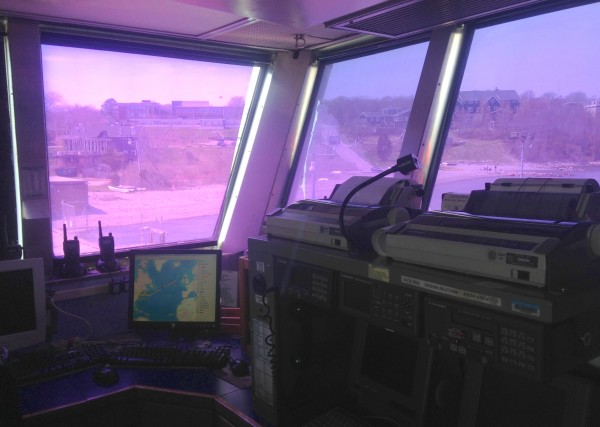
The RV Endeavor is one of the ways the Rhode Island is already a national center for studying climate change.
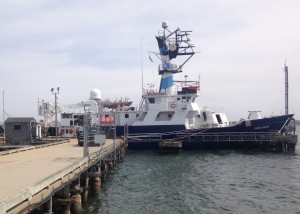 The 185-foot research vessel (or RV) is staffed by URI’s Graduate School of Oceanography and its home port, the Bay Campus. But it’s owned by the National Science Foundation, and it’s paid for and used by whomever happens to need to study planet Earth’s vast oceans.
The 185-foot research vessel (or RV) is staffed by URI’s Graduate School of Oceanography and its home port, the Bay Campus. But it’s owned by the National Science Foundation, and it’s paid for and used by whomever happens to need to study planet Earth’s vast oceans.
“We’re a charter boat for scientists,” said Second Mate Chris Armanetti.
Tuesday the Endeavor leaves on a 30-day trip to Iceland, where Princeton geoscientist Bess Ward will be studying how phytoplankton reacts to different forms of nitrogen. “Some of the kinds of phytoplankton that we think are really important are actually sucking carbon into the ocean,” Ward explains as she readies her equipment in the boat’s main lab for the long trip.
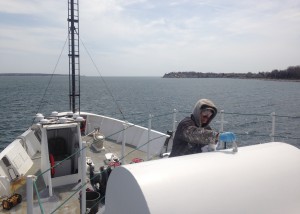 This is the second time her research has taken her aboard the Endeavor, which is one of 24 research vessels in the world equipped to help unlock such scientific mysteries, which Ward assured me are much more crucial than they sound in the abstract. “We care how our ocean ecosystems will respond to global change.”
This is the second time her research has taken her aboard the Endeavor, which is one of 24 research vessels in the world equipped to help unlock such scientific mysteries, which Ward assured me are much more crucial than they sound in the abstract. “We care how our ocean ecosystems will respond to global change.”
Her and eight grad students are traveling more than 2,000 nautical miles to study these phytoplankton at their richest, which is off the coast of Iceland in the North Atlantic during spring. They will be accompanied and assisted by the Endeavor’s crew of 12, who work in three shifts with four people on duty at any given time.
The Endeavor isn’t cheap to operate. Ward, whose grant is for $3 million, is paying URI $24,000 a day for its services.
“It’s important both scientifically and financially,” said Tom Glennon, the director of marine operations for the Graduate School of Oceanography, who said the Endeavor makes between 10 and 12 such trips a year.
“It’s a money spinner for the university, for sure,” said technician/crew member Bill Fanning.
Glennon and Fanning chatted over a catered lunch on the boat after two tractor trailer trucks worth of food were stored on the boat for the trip to Iceland and back. The Endeavor serves three meals a day, with dinner menus ranging from chili to filet mignon, while at sea.
There’s a small dining room, and an even smaller library with a few couches. And other than that, the creature comforts are few and far between. There are small bunk rooms in the hull, with cramped bunk beds in small rooms. Most share bathrooms.
The bulk of the boat is research space. There are three labs on the boat, and most of the deck is for lowering equipment into the depths of the ocean. The cable they were winding the day I visited could stretch 8,000 meters into the sea.
The Endeavor has been all over the world, save for the Indian Ocean. Recent trips include Peru, Hawaii and Scotland.
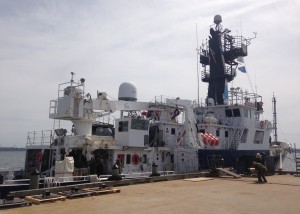 “It’s driven by the science,” said Tom Orvosh, an technician and crew member. “It can get pretty intense at times, if the weather’s rough and people can’t get their work done.
“It’s driven by the science,” said Tom Orvosh, an technician and crew member. “It can get pretty intense at times, if the weather’s rough and people can’t get their work done.
Crew members say seasickness isn’t really a problem for visiting scientists because it usually passes after several hours.
The Graduate School of Oceanography has housed a world-class research vessel since 1962, when legendary dean John Knauss helped the school acquire the RV Trident. In 1977, it replaced the Trident with the Endeavor. The Endeavor was retrofitted in 1992, but it’s nearing the end of its tenure. Crew members said such boats are good for about 30 years, and that it would cost roughly $65 million to replace her.
]]>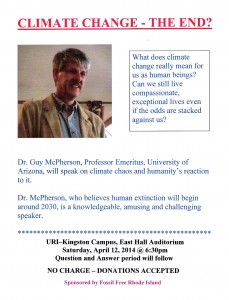
Meanwhile, Fossil Free RI continues the climate conversation with a visit from author, public speaker, and “latter-day gadfly,” Guy McPherson, Professor Emeritus of the University of Arizona, who will speak on climate chaos and humanity’s reaction to it:
- What does climate change actually mean for us as human beings? Can we still live compassionate, exceptional lives even if the odds are stacked against us?
Guy McPherson, who thinks human extinction will begin around 2030, is a knowledgeable, amusing and challenging speaker. This is a chance to hear about instabilities too hard to capture in climate models, topics that many “grown-ups” consider “too scary for the kids.”
McPherson’s view is more dire than that of the majority of climate scientists, but his arguments deserve our serious attention. First of all, there is the One Percent Doctrine which states that
If there’s a 1% chance […], we have to treat it as a certainty in terms of our response. It’s not about our analysis […] It’s about our response.
If this infamous doctrine provides cover for the 1% and its perpetual wars, should it not apply with a vengeance to climate change and the risk of ecocide it poses?
Guy McPherson’s talk will provide the vital counterbalance to the politically motivated censorship imposed upon the IPCC report:
The poorest people in the world, who have had virtually nothing to do with causing global warming, will be high on the list of victims as climatic disruptions intensify, the report said. It cited a World Bank estimate that poor countries need as much as $100 billion a year to try to offset the effects of climate change; they are now getting, at best, a few billion dollars a year in such aid from rich countries.
The $100 billion figure, though included in the 2,500-page main report, was removed from a 48-page executive summary to be read by the world’s top political leaders. It was among the most significant changes made as the summary underwent final review during an editing session of several days in Yokohama.
If you can make it, please join the Facebook event and invite your friends.
This event (no charge — donations accepted) is sponsored by Fossil Free Rhode Island: action for climate justice, urging public institutions that divestment from fossil fuels is the only moral choice.
]]>University of Rhode Island campus, Kingston, RI
URI is a relatively pretty campus, although with the campus constantly expanding its parking, it’s hard to know how long that will be the case. Eco RI has highlighted the campus’ hunger for farmland, which it has been quickly converting into surface lots. URI’s Kingston campus does have a policy of charging a small fee for parking to residents and students, but the need to add more lots suggests that that price does not meet the demand. URI’s other positive features include support for RIPTA passes to students at its Kingston campus, as well as a bike path running nearby it through the villages of South Kingstown and Narragansett. URI has failed so far to make crossing Route 138 to the bike path safe for students, and also has yet to charge any fee or provide any transit incentive for students or faculty at its Providence campus, which is nearby Kennedy Plaza.
Which brings us to. . .
Rhode Island College, Providence, RI
Rhode Island College is a warning of what URI could become. With “free” parking for students (paid for automatically through tuition), RIC doesn’t even charge visitors from outside the university to park. It’s entire campus is wall-to-wall surface lots. It’s the saddest/ugliest thing I’ve ever experienced.
RIC’s policy means higher fees for students, who don’t even find themselves happy with what they get in return:
South Side Hospital Complex, Providence, RI
Whoa! It’s like the surface of the moon over there!
The Providence Streetcar is planned to terminate in the hospital complex, and I certainly hope it will improve development patterns there and reduce the need for so many lots. However, there’s a real need to develop #frequentRIPTA, as the 12 minute frequency planned for peak streetcar trips will not be adequate for such a short route.
One also wonders if doctors and nurses would have more positive impact on the neighborhood’s struggling businesses if they didn’t have to trek across huge lots to get to anything outside of the hospital.
The South Side of Providence doesn’t have a great public reputation, but I’ve spent a lot of time walking and biking down there, and it’s a really nice community with a lot of good things going for it. Another thing that would help reduce this parking crater would be to update the Point Street I-95 crossing. It’s currently designed as a two-lane one way with a lot of fast traffic on both sides, very poor pedestrian access, and virtually no way to cross on bike, except for the fleet of heart. The South Side is deceptively close to downtown Providence, and could have a lot of mobility benefits for low income folks on a one- or zero-car budget if RIDOT hadn’t callously built its infrastructure for circa 1955.
The Dean Street Bridge
This span of bridge crosses U.S. 6 and the Amtrak Northeast Corridor between Federal Hill and Smith Hill, but with no access for transit or bikes. The ramps into Federal Hill are just a stone’s throw from the Viaduct, but apparently the state also thinks it appropriate to waste a huge footprint of land so that people can use highways as local roads. A 2013 assessment by RIDOT found the bridge to be in “fair” condition, and called it “functionally obsolete” (functional obsolescence can refer to a number of things but does not indicate structural problems. It can, for instance, simply mean that the agency feels the bridge needs more “capacity”, i.e., costly widening). The bridge is part of a series of expensive infrastructure projects necessary to U.S. 6 & 10, including the 6/10 Connector, which will come at an estimated cost of $500 Million and will dwarf the cost of the Sakonnet Bridge. The poor design of the Dean Street Bridge, with poor multimodal access, means it’s in a constant traffic jam for users, and cuts of anyone who is not driving.
Perhaps this is a job for a highway removal, and unlike I-195, let’s take it out and just not replace U.S. 6 at all. The 480 foot span of the Dean Street Bridge could then be considerably reduced in for whatever comes next, and multimodal improvements like transit lanes, protected bike lanes and wide sidewalks could carry users other than cars between two of Providence’s nicest neighborhoods.
The Statehouse Lawn

Highlighted by the Projo, The Phoenix, and Providence Preservation Society as a majorly bad land use, the surface lots that Governor Chafee added to Francis Street and the Statehouse lawn have set taxpayers back millions (the Francis Street lot cost $3.1 Million for land acquisition alone, making each of the approximately 100 parking spots $30,000 a pop, without factoring in things like lighting, paving, or drainage costs). To put this in perspective, with matching funds from a City of Providence program, residents could plant 15,000 street trees for this cost, half that if they had no matching funds from the program. In a city of 25,000 street trees, that would represent a huge growth in green space. The Walking Bostonian has reported on the comparative cost of providing bus service compared to parking and found bus service to be cheaper, while a Hartford study recently found that for each parking spot a city gets, it loses $1,200 in tax revenue.
The (Proposed) Garrahy Garage

As we finish our week of educating the I-195 Commission about the need for urban protected bike lanes, the front-and-center position of parking comes to mind. Commissioner Jan Brodie last expressed opposition to the bike lanes, which have broad community support, because they would threaten double parking (which is illegal), and did not agree to using a few on-street spots as loading zones for the court buses and trucks that tend to block the street. The fact that the I-195 Commission has been encouraging public expenditures on a parking garage, at $30,000-$50,000 per spot estimated cost should seem a little out of place with this, especially when it’s noted that Providence’s downtown is covered in parking in every direction, and that getting people on bikes or into transit makes many parking spots available without adding any.
The project has been greenwashed, in my opinion, by adding a bus hub to the bottom of the garage, but of course as a driver what one needs least is a garage to park and catch a bus from, and as a transit user what one needs least is a bus hub at which to park one’s car. So it’s kind of like wrapping yarn around a pigeon to attach it to a rat, and then calling it a magical griffin. . .
Do you have a #parkingcrater to add to our #MarchMadness competition? Tweet one at @transportpvd!
THIS JUST IN: As I was writing this, Barry Schiller of the Coalition for Transportation Choices wrote to say that RIDOT is planning to widen I-95 through parts of Providence, at $46 Million in costs. I can’t wait to see the parking craters that come of that plan if it’s ever approved. . . I <3 RIDOT.
~~~~
Note: An earlier version of this article attributed an incorrect cost estimate for the replacement of the Dean Street Bridge. This post has been updated to include an assessment by RIDOT that does find the bridge to be “functional deficient” and in only “fair” structural condition for its superstructure and substructure. Thanks to commenter Jef Nickerson of Greater City Providence for noting this error.
]]>
